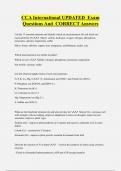CCA International UPDATED Exam Questions And CORRECT Answers List the 17 essential nutrients and identify which are micronutrients (8) and which are macronutrients (9) ✔✔✔ Macro: carbon, hydrogen, oxygen, nitrogen, phosphorus, potassium, calcium, magnesium, sulfur Micro: boron, chlorine, copper, iron, manganese, molybdenum, nickel, zinc Which macronutrients are mobile in plants? Which a re not? ✔✔✔ Mobile: nitrogen, phosphorus, potassium, magnesium Not mobile: calcium, sulfur List the chemical uptake forms of each macronutrient: N, P, K, Ca, Mg, S ✔✔✔ N: Ammonium ion (NH 4+) and Nitrate ion (NO 3-) P: Phosphate ion (H2PO4 - and HPO4 2 -) K: Potassium ion (K+) Ca: Calcium ion (Ca 2+) Mg: Magnesium ion (Mg 2+) S: Sulfate ion (SO4 2 -) What are the beneficial elements (4) and what do they do? ✔✔✔ Silicon (Si) - increases cell wall strength, reduces lodging, improves adaptation to stress (ie drought), improves pest resistance, improves plant vigor Sodium (Na) - improves photosynthesis in C4 plants and may be a substitute to K in some degree Cobalt (Co) - essential for N fixation Selenium (Se) - improves plant growth, essential for animals from feed Describe the function of N in plants ✔✔✔ - Used in the synthesis of amino acids, proteins , enzymes - Found in chlorophyll (photosynthesis), ADP and ATP (energy transfer) Describe the function of P in plants ✔✔✔ - Important component of energy transfer (ADP, ATP) - Important to photosynthesis and respiration - Part of cell nuclear material im portant to cell division Describe the function of K in plants ✔✔✔ - Accelerates growth of meristematic tissue - Regulation of stomatal opening (water loss) - Involved in N and carbohydrate metabolism - Catalyzes some enzymes Describe the function of S i n plants ✔✔✔ - Component of several amino acids (cystine, cysteine, methionine) which are part of many proteins - Involved in protein synthesis and enzyme activation - Forms flavor compounds in mustard, garlic, and onions Define mineralization ✔✔✔ Relea se of a nutrient when an organic material (ie OM, manure, etc.) is decomposed by soil microorganisms. Conversion of a nutrient from the organic to inorganic form. Define immobilization ✔✔✔ Reverse of mineralization. Nutrient is converted from inorganic t o organic form. What is uptake antagonism between ions? ✔✔✔ Two or more ions may compete for uptake by various mechanisms. One ion is said to be antagonistic with regard to the uptake of another ion. Describe mass flow. What nutrients is this important for? ✔✔✔ Nutrients move to a plant root with the water that is being absorbed by the plant. Important for N, Ca, and Mg. Describe diffusion. What nutrients is this important for? ✔✔✔ Movement of a nutrient to a plant roo t due to a concentration gradient between the soil surface and the root surface. Important for P and K. Describe root interception. What nutrients is this important for? ✔✔✔ Occurs when a root grows next to a clay or OM surface and absorbs the nutrients. Actual uptake of a nutrient at the root surface may be passive or active (by a carrier). This is usually a minor way nutrients are absorbed. Solubility of what nutrients increases in flooded soils? ✔✔✔ Iron and manganese What is ammonification? ✔✔✔ Conversion of organic N to ammonium (NH4+) by microorganisms as they decompose an organic material. N rich materials (C:N ratio <15 -
20:1) exhibit high levels of ammonification as they are decomposed (ex. manure) What is nitrification? What are the two steps ? ✔✔✔ First step: Oxidation of ammonium to nitrite (NO2 -) by Nitrosomonas sp. Oxygen is required. Releases H+ decreasing pH. Nitrification inhibitors slow this first step. Second step: Oxidation of nitrite (NO2 -) to Nitrate (NO3 -) by Nitrobacter sp. This is fairly rapid so nitrite does not commonly accumulate in soils. This step also requires oxygen. What is volatilization? What conditions favor volatilization? ✔✔✔ - Conversion of ammonium (NH4+) to ammonia gas (NH3) - High temp, high pH, low CEC, moist/ wet soils, wind, large amounts of surface residues What is denitrification? ✔✔✔ When soil becomes saturated with water, microorganisms first use oxygen and then, when the oxygen is depleted, they use nitrogen in their metabolism. Products of denitrificat ion are gaseous dinitrogen (N2) and gaseous oxides of nitrogen that move to the atmosphere. What is immobilization? ✔✔✔ Nitrogen poor (C:N >20:1) organic materials (ex. wheat straw) can cause microorganisms to remove large amounts of inorganic N from the soil during decomposition because that N is required to build new microbial cells. Decreases N availability. The immobilized N can be mineralized when the microbial cells decompose. Describe symbiotic N fixation. ✔✔✔ Legume supplies energy to Rhizobium which uses that energy and the enzyme, nitrogenase, to convert N2 from the atmosphere into ammonium for the plant Describe how phosphorus, sulfur, molybdenum, and cobalt effect symbio tic N fixation. ✔✔✔ P: needed to provide energy S: important for protein synthesis Mo: part of nitrogenase enzyme Co: cofactor in an enzyme needed for N fixation and nodule growth Describe P fixation in soil ✔✔✔ P fixation: combination of: - P sorption by soil minerals (ex. iron and aluminum oxides) and kaolinite clay; and - P precipitation as calcium phosphates at high pH or iron and aluminum phosphates at low pH. P fixation reduces soil solution P concentration, plant available P, and P mobility Wha t pH range is P most available? ✔✔✔ 5.5-7 Above or below this increases P fixation When looking at a soil test how do you convert ppm to lb/ac? ✔✔✔ ppm x 2 = lb/ac How is proximal sensing used to assess plant nutrient status? ✔✔✔ Ground based proximal sensors are used to measure specific plant properties. A previously found relationship between nutrient status and plant properties is then used to assess nutrient status spatially or temporally.




